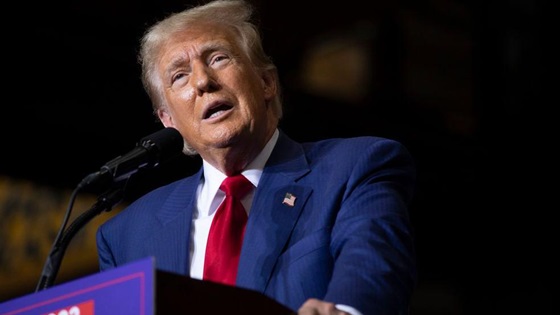Republican presidential nominee Donald Trump has said that in-vitro fertilisation (IVF) treatments will be paid for by insurance companies or the government if he returns to the White House.
“I was always for IVF. Right from the beginning, as soon as we heard about it," he told NBC News on Thursday.
The new campaign pledge comes after his Democratic rival, Vice-President Kamala Harris, and other members of her party have alleged that Republican-led abortion restrictions in some states could further threaten access to fertility treatments.
Trump's announcement could put him at odds with some conservative anti-abortion activists who want to ban IVF for discarding unused human embryos.
But he committed to the new position on Thursday in the interview with NBC.
"Under the Trump administration, we are going to be paying for that treatment," Trump told the news outlet. "Or we're going to be mandating that the insurance company pay."
IVF treatments can be very expensive - often around $20,000 (£15,000) per round - and are rarely covered by insurance in the US. Trump did not explain how this new policy would work or be put into effect.
The Harris-Walz campaign was quick to respond to the former president's new policy position, blaming him for the US Supreme Court's decision to overturn the landmark 1973 abortion case - Roe v Wade - which eliminated the national right to abortion.
State governments can now decide Americans' access to abortion, and at least 14 have banned or put severe restrictions on the procedure.
"Because Trump overturned Roe v. Wade, IVF is already under attack and women’s freedoms have been ripped away in states across the country," said Harris campaign spokeswoman Sarafina Chitika in response to Trump's comments on Thursday.
Trump has previously bragged about appointing three of the six conservatives on the Supreme Court who backed overturning the abortion access law.
"I was able to kill Roe v Wade," the former president posted online in May 2023.
But Trump has attempted to distance himself from his record on abortion, as Harris capitalises on voter concerns about how Republicans could affect reproductive rights.
In his interview, Trump - a Florida resident - also said he planned to vote against a Florida state ballot measure that would prohibit abortion after six weeks, with some exceptions.
"I think the six-week [ban] is too short. There has to be more time," he said. "I am going to be voting that we need more than six weeks."
IVF became a new political lightning rod in America's debate over abortion access in February.
That's when the Republican-controlled Alabama Supreme Court ruled that frozen embryos created through IVF are considered children under state law.
At the time, Trump called on Alabama lawmakers to "quickly find an immediate solution to preserve the availability of IVF in Alabama". They passed a law protecting IVF in March.
The ruling was a political headache for Republicans, forcing several leaders to put out statements objecting to the Alabama ruling that had the possibility of damaging their prospects in an election year.
Forty-two percent of Americans have either used IVF treatments or known someone who did, according to a Pew Survey last year. That percentage rises with increased earnings - 45% among middle-income Americans and 59% for those with high-incomes.
Those individuals are more likely to be white Americans who vote Republican, and many are ones whom Trump hopes to bring back into the political fold after losing their support in 2020.
Trump told supporter about his new position at a rally in Michigan on Thursday.
"Your government will pay for, or your insurance company will be mandated to pay for, all costs associated with IVF treatment," he said.
But Democrats continued to reject that a Trump administration would adopt such a policy on Thursday night.
"Americans have seen with their own eyes how Donald Trump overturned Roe v Wade and paved the way for extreme Maga Republicans to restrict IVF and pass cruel abortion bans across the country, hurting women and families," Democratic National Committee Spokesperson Aida Ross said in a statement.
"When voters head to the ballot box this November, they will vote for the Harris-Walz ticket to protect our freedoms - not Trump and Vance’s all-out assault on our basic rights.”
BBC





